
Simone Signoret was a French actress. She received various accolades, including an Academy Award, three BAFTA Awards, a César Award, a Primetime Emmy Award, and the Cannes Film Festival Award for Best Actress, in addition to nominations for two Golden Globe Awards.

Mary Louise "Meryl" Streep is an American actress. Known for her versatility and accent adaptability, she has been described as "the best actress of her generation". She has received numerous accolades throughout her career spanning over four decades, including a record 21 Academy Award nominations, winning three, and a record 33 Golden Globe Award nominations, winning eight.

Dame Vanessa Redgrave is an English actress. Throughout her career spanning over six decades, Redgrave has garnered numerous accolades, including an Academy Award, a Tony Award, two Primetime Emmy Awards and an Olivier Award, making her one of the few performers to achieve the Triple Crown of Acting. She has also received various honorary awards, including the BAFTA Fellowship Award, the Golden Lion Honorary Award, and an induction into the American Theatre Hall of Fame.

Watch on the Rhine is a 1943 American drama film directed by Herman Shumlin and starring Bette Davis and Paul Lukas. The screenplay by Dashiell Hammett is based on the 1941 play Watch on the Rhine by Lillian Hellman. Watch on the Rhine was nominated for the Academy Award for Best Picture and Paul Lukas won the Academy Award for Best Actor for his performance as Kurt Muller, a German-born anti-fascist in this film.

Alfred Zinnemann was an Austrian-American film director and producer. He won four Academy Awards for directing and producing films in various genres, including thrillers, westerns, film noir and play adaptations. He began his career in Europe before emigrating to the US, where he specialized in shorts before making 25 feature films during his 50-year career.

Samuel Dashiell Hammett was an American writer of hard-boiled detective novels and short stories. He was also a screenwriter and political activist. Among the characters he created are Sam Spade, Nick and Nora Charles, The Continental Op and the comic strip character Secret Agent X-9.
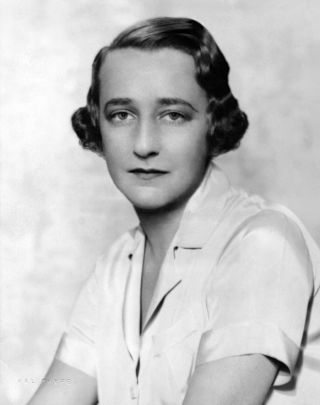
Lillian Florence Hellman was an American playwright, prose writer, memoirist and screenwriter known for her success on Broadway, as well as her communist sympathies and political activism. She was blacklisted after her appearance before the House Committee on Un-American Activities (HUAC) at the height of the anti-communist campaigns of 1947–1952. Although she continued to work on Broadway in the 1950s, her blacklisting by the American film industry caused a drop in her income. Many praised Hellman for refusing to answer questions by HUAC, but others believed, despite her denial, that she had belonged to the Communist Party.
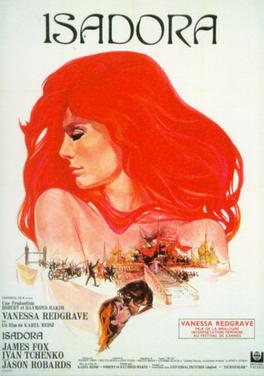
Isadora is a 1968 biographical drama film directed by Karel Reisz from a screenplay written by Melvyn Bragg, Margaret Drabble, and Clive Exton adapted from the books My Life by Isadora Duncan and Isadora, an Intimate Portrait by Sewell Stokes. The film follows the life of American pioneering modern contemporary dance artist and choreographer Isadora Duncan, who performed to great acclaim throughout the US and Europe during the 19th century. A co-production between the United Kingdom and France, it stars Vanessa Redgrave as Duncan and also features James Fox, Jason Robards, and John Fraser in supporting roles.
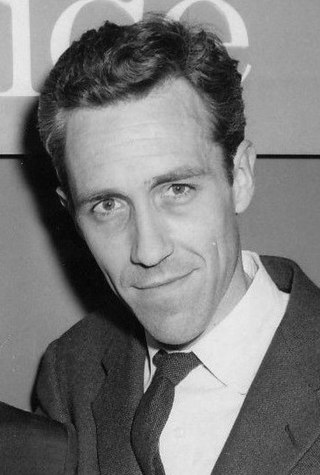
Jason Nelson Robards Jr. was an American actor. Known for his roles on stage and screen, he gained a reputation as an interpreter of the works of playwright Eugene O'Neill. Robards received numerous accolades and is one of 24 performers to have achieved the Triple Crown of Acting having earned competitive wins for two Academy Awards, a Tony Award, and a Emmy Award. He was inducted into the American Theatre Hall of Fame in 1979, and earned the National Medal of Arts in 1997, the Kennedy Center Honors in 1999.
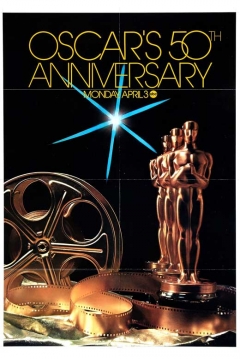
The 50th Academy Awards ceremony, presented by the Academy of Motion Picture Arts and Sciences (AMPAS), honored films released in 1977 and took place on April 3, 1978, at the Dorothy Chandler Pavilion in Los Angeles. During the ceremony, AMPAS presented Academy Awards in 22 categories. The ceremony, televised in the United States by ABC, was produced by Howard W. Koch and was directed by Marty Pasetta. Actor and comedian Bob Hope hosted the show for the 19th time. He first presided over the 12th ceremony held in 1940 and had last served as a co-host of the 47th ceremony held in 1975. Five days earlier, in a ceremony held at The Beverly Hilton in Beverly Hills, California, on March 29, the Academy Scientific and Technical Awards were presented by hosts Kirk Douglas and Gregory Peck.

Dora Doll was a French actress.
Muriel Gardiner Buttinger was an American psychoanalyst and psychiatrist.
Wolf Schwabacher was a prominent Jewish entertainment lawyer, a partner in the New York City law firm of Hays, Wolf, Schwabacher, Sklar & Epstein, whose clients included the Marx Brothers, Lillian Hellman, and Erskine Caldwell.
The 3rd Los Angeles Film Critics Association Awards, honoring the best in film for 1977, were announced on 19 December 1977 and given on 10 January 1978.
Joseph Chamberlain Furnas was an American freelance writer.

Pentimento: A Book of Portraits is a 1973 book by American writer Lillian Hellman. It takes the form of an autobiographical work, focusing on "portraits" various people that had effects on the author throughout her life.
Dash and Lilly is a 1999 American biographical drama television film about writers Dashiell Hammett and Lillian Hellman. The film was directed by actress Kathy Bates, written by Jerry Ludwig, and stars Sam Shepard and Judy Davis. It aired on A&E on May 31, 1999.

Playing for Time is a 1980 CBS television film, written by Arthur Miller and based on acclaimed musician Fania Fénelon's autobiography The Musicians of Auschwitz. Vanessa Redgrave stars as Fénelon.
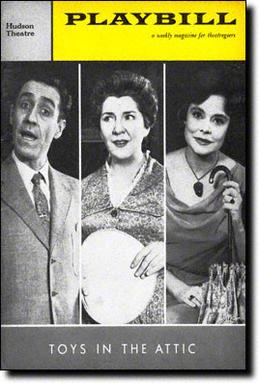
Toys in the Attic is a 1960 play by Lillian Hellman.
The Triple Crown of Acting is a term used in the American entertainment industry to describe actors who have won a competitive Academy Award, Emmy Award, and Tony Award in the acting categories, the highest awards recognized in American film, television, and theater, respectively. The term is related to other competitive areas, such as the Triple Crown of horse racing.














